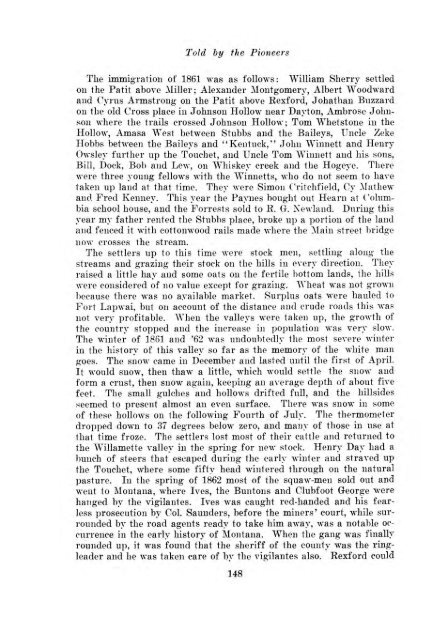Told by the Pioneers - Washington Secretary of State
Told by the Pioneers - Washington Secretary of State
Told by the Pioneers - Washington Secretary of State
You also want an ePaper? Increase the reach of your titles
YUMPU automatically turns print PDFs into web optimized ePapers that Google loves.
<strong>Told</strong><br />
<strong>by</strong> <strong>the</strong> <strong>Pioneers</strong><br />
The immigration <strong>of</strong> 1861 was as follows: William Sherry settled<br />
on <strong>the</strong> Patit. above :3Iiller; Alexander :310ntgomery, Albert 'Woodward<br />
and Cyrus Armstrong on <strong>the</strong> Patit above Rexford, .Johathan Buzzard<br />
on <strong>the</strong> old Cross place in Johnson Hollow near Da:'ton, Ambrose J ohn<br />
I'on where <strong>the</strong> trails crossed Johnson Hollow; Tom 'Vhetstone in <strong>the</strong><br />
Hollow, Amasa '\'est between Stubbs and <strong>the</strong> Baileys, Uncle Zeke<br />
Hobbs between <strong>the</strong> Baileys and" Kentuck," .John \Vinnett and Henry<br />
Owsley fur<strong>the</strong>r up <strong>the</strong> Touchet, and Uncle Tom 'Vinnett and his sons,<br />
Bill, Dock, Bob alld Le,,', on "Thiskey creek and <strong>the</strong> Hogeye. There<br />
were three young fellows with <strong>the</strong> "Tinnetts, who do not seem to han<br />
taken up land at that time. They were Simoll Critchfield, Cy .\fa<strong>the</strong>\\·<br />
anel. Fred Kenney. This year <strong>the</strong> Paynes bought out Hearn at ('olumbia<br />
school house, and <strong>the</strong> Forrests sold to R. G. Xewland. During this<br />
:'ear my fa<strong>the</strong>r rented <strong>the</strong> Stubbs place, broke up a portion <strong>of</strong> <strong>the</strong> land<br />
alld fenced it with cottonwood rails made where <strong>the</strong> ~Iain street hridg'e<br />
now crosses <strong>the</strong> stream.<br />
The settlers up to this time were stock mell, settling along <strong>the</strong><br />
streams and grazing <strong>the</strong>ir stock on <strong>the</strong> hills in e\"Cry direction. They<br />
raised a little hay and some oats on <strong>the</strong> fertile bottom lands, <strong>the</strong> hills<br />
\\'ere considered <strong>of</strong> no value except for grazing. 'Yheat was not grown<br />
hecause <strong>the</strong>re was no a.vailable market. Surplus oats were hauled to<br />
Fort Lapwai, but 011 account <strong>of</strong> <strong>the</strong> distallce and crude roads this was<br />
not very pr<strong>of</strong>itable. "'hen <strong>the</strong> valleys were taken up, <strong>the</strong> growth <strong>of</strong><br />
<strong>the</strong> country stopped and <strong>the</strong> illcrease in population 'was ven' slo\\'.<br />
The winter <strong>of</strong> 1861 and '62 was undouhtedl\' <strong>the</strong> most severe winter<br />
•<br />
in <strong>the</strong> historv <strong>of</strong> this vallev so far as <strong>the</strong> memory <strong>of</strong> <strong>the</strong> white man<br />
••<br />
•<br />
g'oes. The snow came in December and lasted until <strong>the</strong> first <strong>of</strong> April.<br />
It would snow, <strong>the</strong>n thaw a little, which would settle <strong>the</strong> snow and<br />
form a crust, <strong>the</strong>n snow again, keeping an a\"Crage depth <strong>of</strong> about fin<br />
feet. The small gulches and hollows drifted full, and <strong>the</strong> hillsides<br />
seemed to present almost an even surface. There was snow in some<br />
<strong>of</strong> <strong>the</strong>se hollows on <strong>the</strong> following Fourth <strong>of</strong> .Jul:'. The <strong>the</strong>rmometer<br />
dropped down to 37 degrees below zero, and mall~' <strong>of</strong> those in use at<br />
that time froze. The settlers lost most <strong>of</strong> <strong>the</strong>ir cattle and returned to<br />
<strong>the</strong> 'Villamette valley in <strong>the</strong> spring for ne\\' stock. Henry Day had a<br />
hunch <strong>of</strong> steers that escaped during <strong>the</strong> early winter and strayed up<br />
<strong>the</strong> Touchet, where some fifty head wintered through on <strong>the</strong> natural<br />
pasture. In <strong>the</strong> spring <strong>of</strong> 1862 most <strong>of</strong> <strong>the</strong> squaw-men sold out and<br />
went to Montana, where Ives, <strong>the</strong> Buntons and Clubfoot George were<br />
hanged <strong>by</strong> <strong>the</strong> vigilantes. Ives was caught red-handed and his fearless<br />
prosecution <strong>by</strong> Col. Saunders, before <strong>the</strong> miners' court, while surrounded<br />
<strong>by</strong> <strong>the</strong> road agents ready to take him away, was a notable occurrence<br />
in <strong>the</strong> early history <strong>of</strong> Montana. 'Vhen <strong>the</strong> gang was finally<br />
rounded up, it was found that <strong>the</strong> sheriff <strong>of</strong> <strong>the</strong> county was <strong>the</strong> ringleader<br />
and he \\'as taken care <strong>of</strong> <strong>by</strong> <strong>the</strong> vigilantes also. Rexford could<br />
148
















